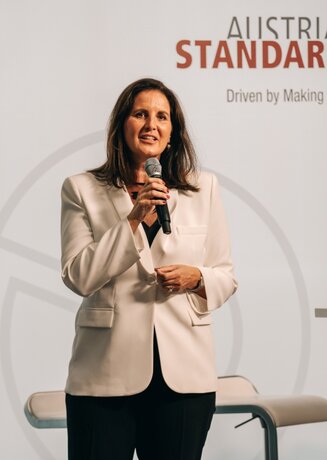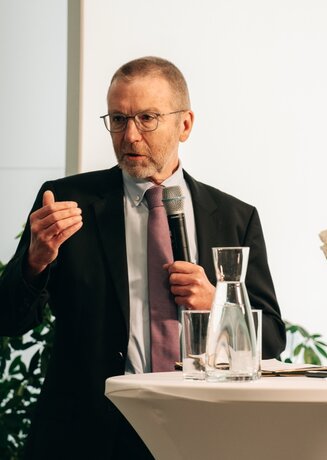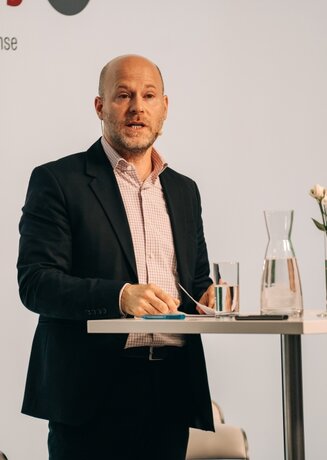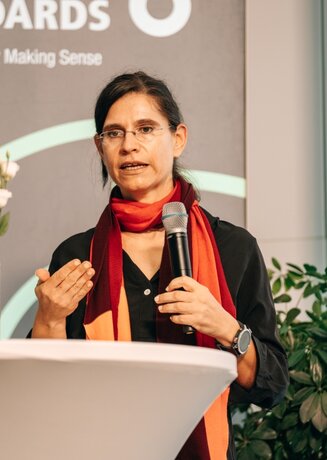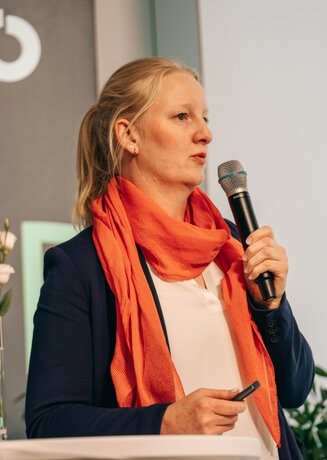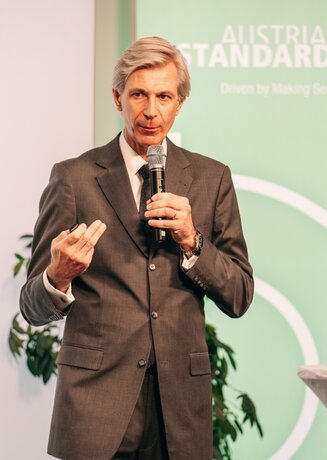Expert Talks 2023
Standards have been raised to a strategic level thanks to the EU standardisation strategy. They are a key element of a resilient, green and digital EU single market – but is the EU paper just slick window dressing or is it actually a big opportunity? Moderated by Gudrun Ghezzo, a well-known panel of experts explored these and other questions concerning the EU standardisation strategy.
Standards reach a new level
Austrian Standards CEO Valerie Höllinger laid out during the greeting that the EU standardisation strategy is a clear driver for highlighting the benefits of standards. Claims are being staked in many areas such as AI or the energy or mobility transition. Global future trends are highly connected topics. Standards help Europe to actively shape the competition.
Christian Gabriel, Managing Director, OVE Standardization, added that standards embody the general perspective and are associated with the consensus. Anyone not involved in development, is allowing others to make the decisions. Standardisation is definitely a matter for the boss, as it creates legal certainty for companies. Standards have strong strategic and tactical effects on the economy.
Gwenole Cozigou, Director DG for Internal Market, Industry, Entrepreneurship and SMEs at the European Commission laid out the fact that it is still too early for conclusions to be drawn from experiences with the standardisation strategy. However, it is certainly true that the single market would not work without standardisation. Whereas standards were previously thought to be a topic for experts, they have now been brought up to a political and strategic level. During his speech, he laid out the fact that the European Commission still places its trust in the well-known standardisation organisation for operations.
Standards require education and skills
It is very important to Georg Konetzky, Director General, National Market Strategies Department, Austrian Federal Ministry for Labour and Economy, that awareness of standardisation is increased. Konetzky views the introduction of the High-Level Forum on European Standardization as a good thing. Initial experiences would show that it can improve collaboration between the EU Commission, economy, research, civil society and standardisation organisations. Examples, such as standards regarding hydrogen production or guaranteeing data security, are particularly relevant.
Bernhard Spalt, Technical Officer in the Department of Standardisation, Austrian Electrotechnical Association (OVE), highlighted the importance of education and training. Things are a lot more advanced in Asia, as there are entire standardisation courses there.
EU standardisation strategy brings the boost
Paul Schmidt, Secretary General, Austrian Society for European Politics, summarised the importance of standardisation for the European single market: 30 years after the single market was founded, it has grown to be the largest market in the world, including the EEA – thanks to standards. However, we cannot leave developing standards to others – they have to be made by Europeans for Europeans, states Schmidt convinced. Political will is required for this.
Urs Fischer, CEO, Swiss Association for Standardization (SNV), and Hermann Brand, European Standards Affairs Director, IEEE Standards Association, under the moderation of Karl Grün, Director Standards Development, Austrian Standards examined the question of what the EU standardisation strategy means for standardisation organisations specifically.
Urs Fischer determined that the interplay with political legislation has long been neglected. However, Europe has to remain active in the competition with the USA and China and get involved to create awareness of the benefits of standards. Fischer is convinced that initiatives such as the EU standardisation strategy will provide a boost.
Hermann Brand added that education is a perennial issue in standardisation. Experts are ultimately a key resource – and they are not just engineers. This new talent also has to made aware that the world of standards is exciting, and programmes are also required which feed the results of research into standardisation more quickly.
Standards create certainty
Adriane Kaufmann, Consultant, Department for Environmental and Energy Policy, Austrian Economic Chamber, reported from the view of a stakeholder. Making standardisation easier is a focus of the EU Single Market Programme 2021-2027. Kaufmann praised the standardisation strategy as another positive step towards stronger collaboration. Kaufmann also highlighted the importance of standards for the green transformation and gave examples, such as multi-use or e-charging systems which would not have been able to catch on without standards.
Bastian Prugger, Legal Adviser, AVL List GmbH, illustrated the interplay of economy, technology, law and standardisation based on the example of autonomous driving. He came to the conclusion that innovations require legal certainty as well as reliable technical details to reach the market. Standards are an important basis for both.
Roland Sommer, Managing Director, Industrie 4.0 Austria, took a similar line. He believed that standards provide guidance and help when making investment decisions.
Transformation requires harmonised standards
Hanna Schreiber, Head of Expert Team; Senior Expert Carbon Management and LCA, Environment Agency Austria, pointed out that the EU regulation on taxonomy for sustainable activities, supply chain legislation and the Ecodesign Regulation refer to a "multi-criteria environmental assessment" with standardised and harmonised methods. Such methods do not, however, exist at the present time. The requirements of methods to calculate carbon footprints cannot currently be met at all. This clearly shows the importance of standards and their harmonisation.
Roman Stiftner, Managing Director of the Austrian Mining and Steel Association, Austrian Non-Ferrous Metals Federation of the Austrian Economic Chamber and General Director of EUMICON, stressed that standards need to keep up with current challenges. China is pursuing geopolitical interests with standardisation. In contrast, standards were long seen as a very technical matter in Europe. Stiftner therefore calls for a "more holistic view" in Europe. The standardisation strategy is a key step in this direction.
Rita Kremsner, Public Relations/Deputy Managing Director at ACR – Austrian Cooperative Research, reported from the points of view from applied research. For them, standards are an incentive for innovation, as they enable technologies and methods to be measured, tested and certified. However, companies that carry out research have to find a balance between the necessary regulation and the additional burden.
Preeti Ohri Khemani, Senior Director Partnership & Ecosystem Management, Infineon Technologies Austria AG, is also convinced that standards are key tool for companies. The semiconductor industry simply would not be possible without standards according to the expert. Europe is a role model because you can bring together standardisation organisations, research and industry.
Economic importance of standards
Birgit Meyer, Senior Economist, WIFO – Austrian Institute of Economic Research, summarised the economic importance of standardisation as a basis for trade. The harmonisation of standards results in market growth and the EU is setting benchmarks here. Many European standards are adopted by third-party states because they want to become involved in market activities. Meyer is convinced that European standards can therefore have a positive impact internationally.
